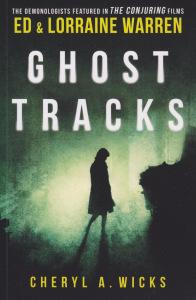 Ed and Lorraine Warren aren’t easy to figure out.I realize that for someone who holds an actual doctorate from a bona fide, internationally recognized research university this might be something strange to say.That’s because the standard academic response is simple dismissal.Ed, at least, was known to have stretched the truth from time to time, but that’s not the same as never having reported weird things that actually happened.This is why I’ve long advocated academics at least looking at the evidence—rare though it may be—before the simple hand-waving dismissal.Part of the problem is that the Warrens’ books were written by credulous followers who don’t question things nearly enough.Ghost Tracks, by Cheryl A. Wicks, may be the last of this strange genre of hortatory, biographical accounts “by” the Warrens written while Ed was still alive.
Ed and Lorraine Warren aren’t easy to figure out.I realize that for someone who holds an actual doctorate from a bona fide, internationally recognized research university this might be something strange to say.That’s because the standard academic response is simple dismissal.Ed, at least, was known to have stretched the truth from time to time, but that’s not the same as never having reported weird things that actually happened.This is why I’ve long advocated academics at least looking at the evidence—rare though it may be—before the simple hand-waving dismissal.Part of the problem is that the Warrens’ books were written by credulous followers who don’t question things nearly enough.Ghost Tracks, by Cheryl A. Wicks, may be the last of this strange genre of hortatory, biographical accounts “by” the Warrens written while Ed was still alive.
Skepticism is very important.But so is listening to people.What I find compelling is that similar weirdness—frequently dismissed out of hand—has been recorded throughout the length and breadth of history and across the entire globe.The problem is that many of these things fall outside current scientific means of testing.While perhaps not widely known, very reputable universities quietly explore these possibilities with actual science.Part of the problem of the Warrens, as well as various other “ghost hunters” is that they use scientific equipment and think that makes them scientists.It doesn’t.Science requires deep engagement and many years of strenuous study.And yes, skepticism has to be part of it.The thing the Warrens have to offer is that they realize(d) that when science does engage the supernatural interesting things emerge.
Sensationalism, however, is the slave of capitalism.Books sell better when they make extraordinary claims and declare they’re based on true events.Trying to make a living investigating the paranormal led the Warrens, it seems, to tip the balance a little too far in the way of credulity.Some of the stories in Ghost Tracks are more believable than others.Some are just plain frustrating.Ed’s interview with George Lutz (of Amityville fame), for example, is full of dropped balls.A good question receives an intriguing answer only to have the subject immediately switched by the interviewer.Even just a little skepticism and a follow-up question would have done scads to improve the believability of the story.This is something a scientist would have known.Someone as smart as Sir Arthur Conan Doyle, although his Sherlock Holmes generally foundratiocination led to physical explanations, believed in the supernatural.If only his Holmes might’ve been brought to this discussion we might possibly have learned something.
